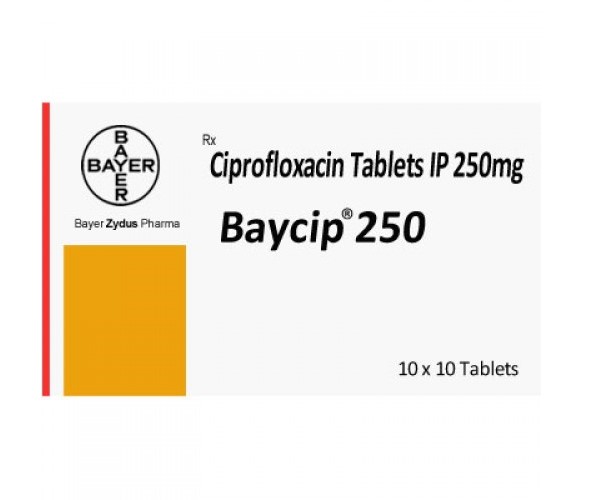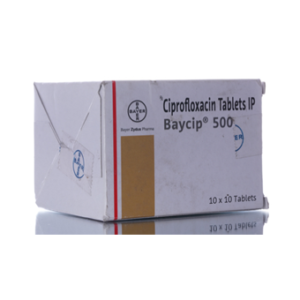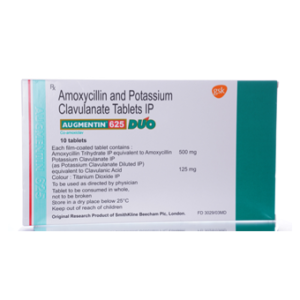Description
Ciprofloxacin (Cipro – Baycip) 250 mg tablet is a second-generation fluoroquinolone antibiotic drug only indicated in infections caused by susceptible bacteria. Ciprofloxacin is formulated for oral, intravenous, intratympanic, ophthalmic, and otic administration for a wide variety of bacterial infections.
Drug = Ciprofloxacin
Strength = 250 mg
Manufacturer = Bayer
Quantity per sleeve = 100 Tablet (for the price quoted)
How To Take Ciprofloxacin (Cipro – Baycip) 250 mg Tablet
Use Ciprofloxacin exactly as directed by your doctor or according to the instructions on the label. Do not use more or less than instructed by your doctor.
The dose of this medicine will be decided by your doctor. Your doctor will advise you on the treatment time frame depending on the severity of your infection.
Ciprofloxacin must be used at regular intervals for it to be effective. Continue using this medicine even when you feel better. Do not stop using it unless instructed by the doctor.
Dosage of Ciprofloxacin (Cipro – Baycip) 250 mg Tablet
Treatment and postexposure prophylaxis of inhalation anthrax: 500 mg twice a day for 60 days from the confirmation of Bacillus anthracis exposure.
Bone and joint infections: 500-750 mg twice a day. Maximum treatment duration: 3 months.
Lower respiratory tract infections; Upper respiratory tract infections; Skin and soft tissue infections: 500-750 mg twice a day for 7-14 days.
Malignant otitis externa: 750 mg twice a day for 7-14 days up to 3 months.
Prostatitis: 500-750 mg twice a day. Treatment duration: 2-4 weeks (acute); 4-6 weeks (chronic).
Uncomplicated pyelonephritis: 500 mg twice a day for 7 days (immediate-release); 1,000 mg every 24 hours for 7-14 days (extended-release).
Complicated pyelonephritis: 500-750 mg twice a day for at least 10 or up to 21 days if required.
Complicated cystitis: 500 mg twice a day for 7 days (immediate-release); 1,000 mg every 24 hours for 7-14 days (extended-release).
Uncomplicated cystitis: 250-500 mg twice a day for 3 days (immediate-release); 500 mg every 24 hours for 3 days (extended-release).
Typhoid fever: 500 mg twice a day for 7 days.
Gonococcal urethritis; Gonococcal cervicitis In patients with ciprofloxacin-susceptible N. gonorrhoeae infection: 500 mg as a single dose. Refer to local guidelines.
Epididymo-orchitis; Pelvic inflammatory disease In patients with ciprofloxacin-susceptible N. gonorrhoeae infection: 500-750 mg twice a day for at least 14 days. Refer to local guidelines.
Intra-abdominal infections: 500-750 mg twice a day for 5-14 days.
Diarrhea: 500 mg twice a day for 1-5 days depending on the pathogen.
Prophylaxis against meningococcal meningitis: 500 mg as a single dose.
Missed Ciprofloxacin (Cipro – Baycip) 250 mg Tablet
If you often forget to take your medicine, let your doctor and pharmacist know.
Take the missed dose as soon as you remember. If it is almost time for your next dose, skip the missed dose and return to your usual dosing schedule.
Do not double a dose under any circumstances.
Overdose
Signs of overdose may include the following:
- Dizziness
- Tremor
- Headache
- Tiredness
- Seizures
- Hallucinations
- Confusion
- Abdominal discomfort
- Crystalluria
- Hematuria
- Acute renal and hepatic impairment.
Seek medical help immediately.
Contraindications
People with the following medical conditions should not take Ciprofloxacin:
- Hypersensitivity to ciprofloxacin or other quinolones
- History or risk of QT prolongation
- Known history of myasthenia gravis
- Concomitant use with tizanidine
Side Effects of Ciprofloxacin (Cipro – Baycip) 250 mg Tablet
Ciprofloxacin may have the following side effects:
- Irreversible tendinitis
- Tendon rupture
- Peripheral neuropathy
- Seizures
- Increased intracranial pressure
- QT interval prolongation
- Torsades de pointes
- Depression
- Psychosis
- Suicidal ideation
- Aortic aneurysm ruptures or dissection (long-term use)
- Photosensitivity reactions
- Hemolytic reactions (in G6PD deficiency patient)
- Hyperglycemia
- Delayed corneal healing (ophth)
- Crystalluria (rare)
- Jaundice
- Ear pruritus
- Otitis media
- Pain at the application site.
- Corneal deposits
- Burning sensation
- Conjunctival hyperemia
- Crusting of eyelid
- Eye pruritus
- Nausea
- Vomiting
- Diarrhea
- Abdominal pain
- Dyspepsia
- Fever
- Irritability
- Hepatitis
- Inj and infusion site reactions
- Increased transaminases
- Myalgia
- Arthralgia
- Increased intracranial pressure
- Dizziness
- Headache
- Restlessness
- Tremor
- Insomnia
- Nervousness
- Somnolence
- Rhinitis
- Nasopharyngitis
- Rash
Potentially Fatal:
- Hypoglycemia
- Hepatic necrosis
- Anaphylaxis
- Stevens-Johnson syndrome
- Toxic epidermal necrolysis
- Severe myasthenia gravis exacerbation
- C. difficile-associated diarrhea
- Pseudomembranous colitis
Warnings of Ciprofloxacin (Cipro – Baycip) 250 mg Tablet
Do not use Ciprofloxacin if you ever had an allergic reaction to this medicine or any similar antibiotics such as moxifloxacin, norfloxacin, ofloxacin, and nalidixic acid.
Always notify your doctor and pharmacist if you are taking any other medicines, including herbal tonics such as traditional Chinese medicines, supplements and medicines that you buy without a prescription.
This list does not include all medicines that may interact with Ciprofloxacin.
How Does It Work?
Ciprofloxacin is a fluoroquinolone anti-infective agent that works by inhibiting both DNA gyrase and topoisomerase IV, which are essential in the replication , transcription, repair and recombination of bacterial DNA.
Uses
Ciprofloxacin is used to treat the following conditions:
- Treatment and postexposure prophylaxis of inhalation anthrax
- Bone and joint infections
- Lower respiratory tract infections
- Upper respiratory tract infections
- Skin and soft tissue infections
- Malignant otitis externa
- Prostatitis
- Uncomplicated pyelonephritis
- Complicated pyelonephritis
- Complicated cystitis
- Typhoid fever
- Epididymo-orchitis
- Pelvic inflammatory disease
- Intra-abdominal infections
- Acute prostatitis
- Pelvic inflammatory disease
- Corneal ulcer
- Superficial ocular infections
Special Precautions and Connected Warnings
Take special precautions if you have the following conditions:
- Patient with known or suspected CNS disorders
- Risk factors predisposing to seizures or lower seizure threshold
- History or risk factors for QT interval prolongation
- Torsades de pointes
- Uncorrected hypokalemia/hypomagnesemia
- Heart failure
- Myocardial infarction
- Bradycardia
- Positive family history of aneurysm disease
- Pre-existing aortic aneurysm or dissection
- Marfan syndrome
- Vascular Ehlers-Danlos syndrome
- Hypertension
- Peripheral atherosclerotic vascular disease
- Diabetes
- Rheumatoid arthritis
- G6PD deficiency
- Renal and hepatic impairment
- Elderly
- Children
- Pregnancy
- Lactation
- Immunocompromised febrile neutropenic patients
Storage Conditions
- Store below 30°C, away from the reach of children.
- Protect from light.
- Do not use Ciprofloxacin that is expired or out of expiry date.




